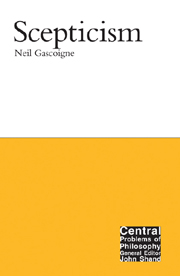4 - Transcendental meditations
Summary
No worries!
In Hume's hands it turns out that if Descartes's sceptical possibilities ultimately don't worry us, it is not because we have a reason not to worry; rather, it is simply that confronted with the exigencies of life away from the study our natural ‘instinct’ to believe reasserts itself. This limitation on reason is double-edged, however, for it is also why we can't show as a rule why we ought not to be worried. As a result we cannot vindicate what we otherwise take to be uncontentious features of our experience – that they are of an external world of causally related objects, for example. The lesson seems to be that whilst untrammelled speculation leads reason (when adopting the theoretical attitude) to make philosophical claims it cannot justify, ‘naturalizing’ reason to the point where it can only trace relations of ideas and matters of fact deprives it of the resources to sustain any normative reflection on the epistemic practices of common life or to see key features of our experience as anything other than illusory. The upshot of the Humean Paradox is that we have to concede victory to the sceptic.
In this chapter we'll examine approaches to sceptical problems that set less onerous limits on reason in order to show that we do have a right not to worry. Our starting-point will be Immanuel Kant. Where Descartes's ‘First Philosophy’ was a response to the pk-scepticism of his own time, Kant's ‘Transcendental’ philosophy is similarly motivated.
- Type
- Chapter
- Information
- Scepticism , pp. 100 - 132Publisher: Acumen PublishingPrint publication year: 2002
- 1
- Cited by

